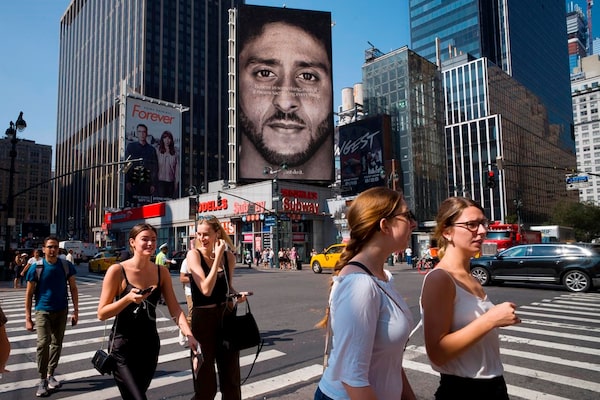Bruce Philp is a branding consultant and author of Consumer Republic.
I’ve always admired Nike, professionally speaking. The last great brand of the 20th century, perhaps the first postmodern brand ever, Nike changed what marketing means by selling people something to believe in, even if it was only themselves. Normal human beings – those who don’t work in sales – will snort at this, but the proof is in the numbers, in Nike’s immense cultural influence and in its universality. Even as it has sometimes careened from novelty to novelty, Nike has fundamentally always made money by appealing to our better selves. You can be more, the swoosh says. Just do it.
This is lofty ground for a corporation, especially in these cynical times. And it’s exactly what some people fear Nike imperiled this week when it made Colin Kaepernick the pointy end of a campaign to celebrate the 30th anniversary of its mythic slogan, “Just do it.” The former NFL quarterback made headlines in 2016 by kneeling during the pregame national anthem to protest “a country that oppresses black people and people of colour.” That gesture made him instantly famous and ignited a movement, but it also sidelined his career. Mr. Kaepernick seemed like a strange bet for Nike to make.
And predictably, when Nike announced Mr. Kaepernick’s starring role in its anniversary campaign, not everyone was inspired. Angry people burned their shoes on Twitter. One spokesperson for a conservative think tank summarized the rage on the right like this: “By promoting [Mr. Kaepernick], Nike is appealing to a small, radicalized market that supports Black Lives Matter and apparently hates the police. Just ask ESPN and the NFL how that's working out for them,” and called the company’s decision “a slap in the face to investors.” Indeed, its stock dipped a little this past week, and even sensible commentators wondered aloud if Nike had just blown it.
They needn’t have worried. I suspect this will turn out to be one of those Nike masterstrokes that has kept the brand’s street cred burnished for three decades.

People walk by a Nike advertisement featuring Colin Kaepernick in New York on Sept. 6, 2018.Mark Lennihan/The Associated Press
To begin with, it’s naive to imagine that Nike didn’t carefully consider the potential downside of signing Mr. Kaepernick. As brand risks go, this one is pretty quantifiable, lying as it does along a tragically familiar American cultural fault line. It’s virtually certain that the company knows the politics of its customers as intimately as it knows where they live and how they play. And it is a public company, after all; if Nike took a chance like this, it’s because it had a quantitative basis for believing the move would not materially hurt its business. This could not have been an impetuous decision, nor as risky as it appeared. Still, did that make it smart?
To answer that, you have to understand that with brands, as with all popular culture, the past is contextual. People don’t generally remember a company’s marketing, but they remember how it made them feel, sometimes for generations. And when it comes to Nike, people remember heroes. Heroes have been the beating heart of Nike’s narrative since before Michael Jordan. Since even before “just do it” made its debut in a commercial about an 80-year-old jogger named Walt Stack. Since, in fact, Oregon running coach Bill Bowerman, Nike’s founder, made a legend out of a gifted, mouthy kid named Steve Prefontaine.
To a lot of people, Mr. Kaepernick is just that, a hero. And he personifies the archetype on which Nike built its empire: the fearless, principled maverick. More important, Nike has found in Mr. Kaepernick a perfect avatar for heroism in this fraught age: someone gentle, positive, a warrior for justice. Once you understand Nike’s existential dependency on heroes, it’s hard to see there ever was any danger in adopting Mr. Kaepernick and his cause. It’s also hard to see what else they could have done, who better they could have chosen to tell us all we can be more if we just do it, and make that sound fresh again.
In a few weeks, this will all be forgotten. The markets will remember why they liked NKE. Football will be played, and happy, jersey wearing fans will fill the stands. The people who hated Nike for this will move on to some fresh outrage, while its fans will be left with a persistent feeling that Nike still matters. Far from being a fatal mistake, that was almost certainly the point of all this, and it’s a game nobody plays better.